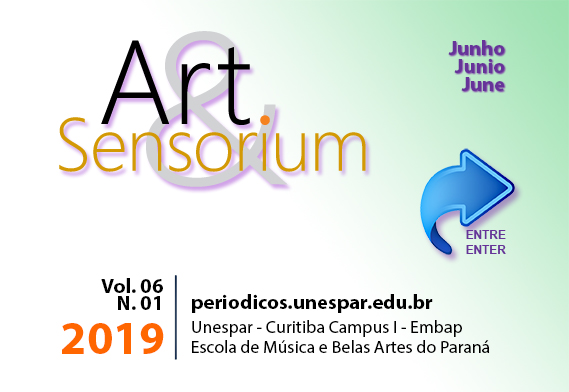Criatividade e Estados Não Ordinários de Consciência
DOI:
https://doi.org/10.33871/23580437.2019.6.1.014-033Keywords:
Criação, Arte Visionária, Psicodélicos, ArteAbstract
O texto a seguir é uma adaptação de um trecho da tese defendida em 2018, a qual tem como premissa investigar processos criativos e Estados Não Ordinários de Consciência – ENOC. Aqui, especificamente, é feito um levantamento bibliográfico das principais pesquisas realizadas no último século, com a proposta de estudar a possibilidade criativa dos psicodélicos. É dado maior atenção às pesquisas com interesse nas potencialidades da ayahuasca (preparo indígena de bebida psicotrópica), por ser o interesse principal da tese. É também traçado um breve histórico das pesquisas com o viés criatividade e psicodélicos – o qual remota há centenas de anos. O objetivo principal aqui foi buscar compreender se de fato é possível dizer se os psicodélicos são agentes estimuladores de criatividade ou não. De acordo com os dados levantados, as respostas são inconclusivas. É preciso desenvolver novas e específicas metodologias para tratar o tema. Por outro lado, mesmo não podendo afirmar, de fato, o potencial criativo dos psicodélicos, é notória a influência destes na criação dos artistas que os experimentaram.Downloads
Download data is not yet available.
Downloads
Published
2019-06-15
Issue
Section
Artigos
License
Copyright (c) 2022 International Interdisciplinary Journal of Visual Arts - Art&Sensorium

This work is licensed under a Creative Commons Attribution 3.0 Unported License.
Authors who publish with this journal agree to the following terms:- Authors retain copyright and grant the journal right of first publication with the work simultaneously licensed under a Creative Commons Attribution License that allows others to share the work with an acknowledgement of the work's authorship and initial publication in this journal.
- Authors are able to enter into separate, additional contractual arrangements for the non-exclusive distribution of the journal's published version of the work (e.g., post it to an institutional repository or publish it in a book), with an acknowledgement of its initial publication in this journal.
- Authors are permitted and encouraged to post their work online (e.g., in institutional repositories or on their website) prior to and during the submission process, as it can lead to productive exchanges, as well as earlier and greater citation of published work (See The Effect of Open Access).





